'It's a different landscape to Baddiel and Skinner': how Fantasy Football League cleaned up its act
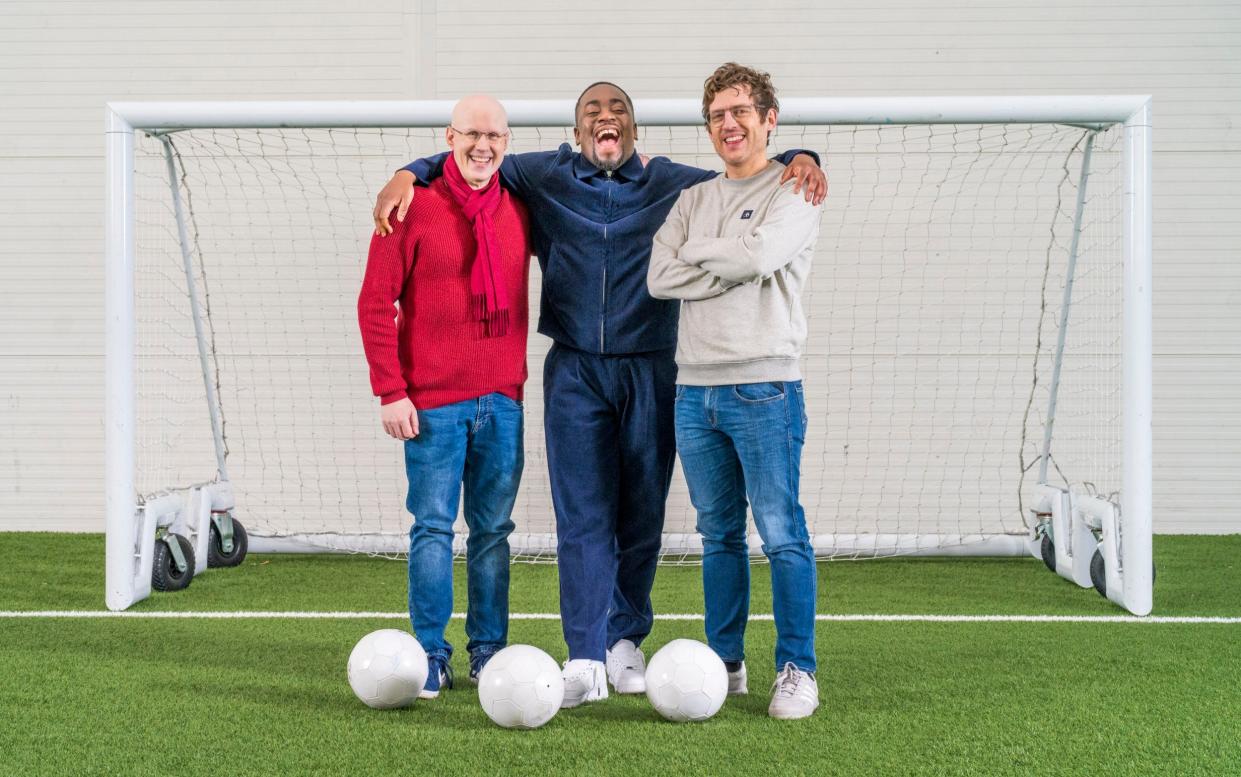
Hosted by Frank Skinner and David Baddiel between 1994 and 1996 (then sporadically until 2004), Fantasy Football League was revived last year to considerable acclaim and with new hosts, each of them comedians: Matt Lucas and Elis James slouching on the sofa, with Andrew Mensah taking the Angus “Statto” Loughran position behind the breakfast bar. Fans of the original could recognise the format, features and fanzine-friendly tone; newcomers, it was hoped, would not be put off by the banter-gone-bad that blighted the original.
FFL launched at a time when football and alternative comedy were entering the mainstream and lads’-mag culture was ascendant – FFL’s first guests were Peter Cook and Mandy Smith – but the show is clouded now by moments of toxicity. Most notably, the infamous racist bullying of Jason Lee, the Nottingham Forest striker, for which Baddiel (who blacked up for the role) and Skinner eventually apologised.
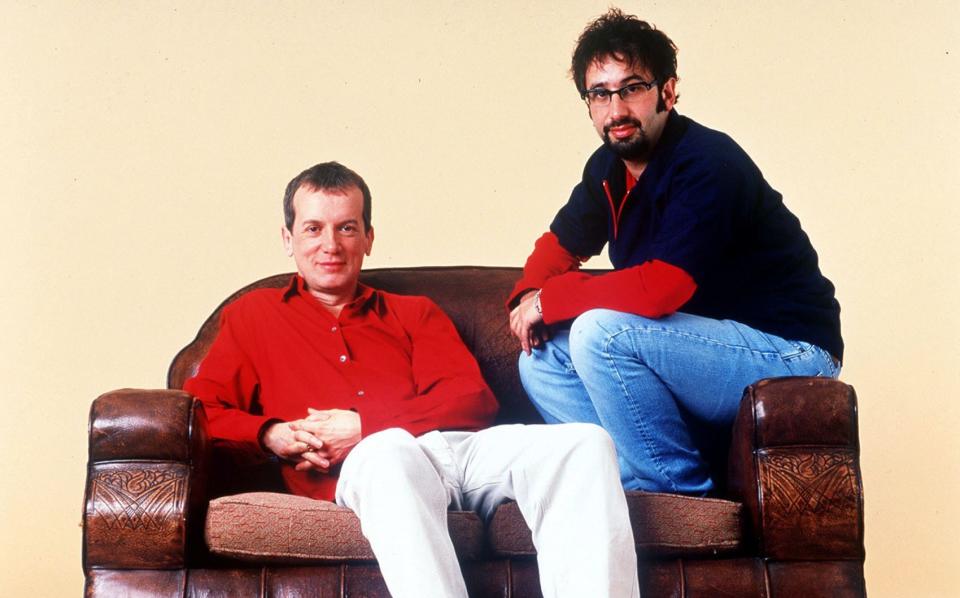
Casting Lucas in the new iteration was a potentially risky move, given the comedian himself had apologised for using blackface in Little Britain sketches. The show, to its credit, took this on in the very first episode, with Mensah joking that Lucas could garner some good PR by taking the knee. Lucas later quipped that the atrocious graphics of the Little Britain PlayStation 2 game “have aged better than the jokes”.
Has the 2020s version of FFL consciously moved on from the comedy of cruelty aimed at Lee et al? James thinks so. “If there are comedy writers in the room, you should be able to find a funnier angle than another misplaced pass from Harry Maguire,” he says, referring to the constantly mocked Manchester United defender.
“All that’s been done to death on social media, anyway. The best comedy reflects its time and it’s a very different landscape to the one Frank and David were in. I watched the show at 14, when you’re discovering television for yourself but are too young to go to pubs. It’s one of my formative comedic memories, but, as much as I adored it, we’re making a 2024 version, not a 1994 version.”
Despite that, the show has retained something of an edge, with Sky having to apologise to an incensed Nottingham Forest for a sketch featuring James as their then-manager Steve Cooper. A neat joke about Forest’s bloated squad was overshadowed by James’s appearance, with the Welsh comedian half-closing one eye in a crude imitation of Cooper. (Cooper’s appearance is often the subject of unpleasant terrace mockery.)
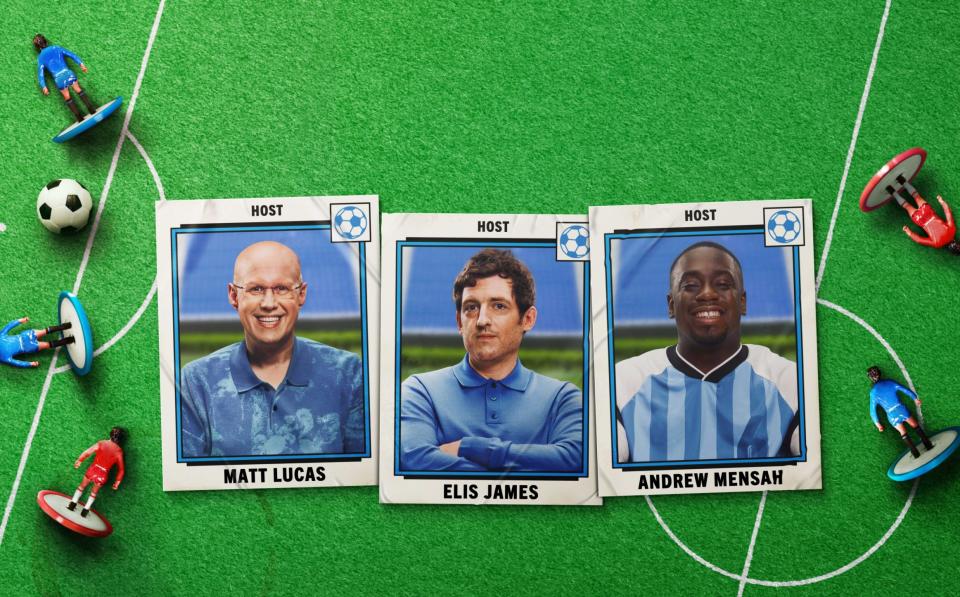
James, however, found Sky’s apology perplexing: “I’ve never known who that complaint came from – it was a few weeks after the show. It was odd. But he’s [Cooper] out of work now, maybe we should have him as a guest.” Lucas – who dressed as Luciano Pavarotti for the sketch, in a presumed reference to the appearance of Forest owner Evangelos Marinakis – points out that the subject of the joke was the club’s risible transfer policy.
Controversy aside, the trio have been careful not to tamper with the fundamentals of a cult-classic show. We’re talking at a sports centre in Ealing, west London, after the filming of Phoenix from the Flames, a classic FFL segment in which former pros recreate famous moments from their footballing history in farcical fashion. “Emile Heskey had good comic chops, didn’t he?” marvels Lucas of their latest stooge.
Lucas has watched Arsenal since childhood, James is a lifelong Swansea City supporter, and Mensah a Crystal Palace fan, thanks to his cousin Eberechi Eze’s exploits on the wing. Each could talk about the game for days, hence passionate diversions on Marcus Rashford, James Ward-Prowse and Miguel Almirón have to be curtailed. VAR provokes a predictable storm (“Patrick Bamford being offside by an armpit is an absurdity!”) as I list a few of the game’s modern woes, from sportswashing to betting sponsorship. “There are plenty of things to be very angry about,” James acknowledges.
Yet, for all FFL’s veneration of the game’s history, nostalgia has its limits. Lucas recalls terrifying crushes at Highbury’s North Bank in the 1980s: “I thought I was going to die after one game against Everton, I was so close to losing consciousness. I’ve never had anything like that at the Emirates, and I certainly feel safer watching football now. It’s more inclusive.”
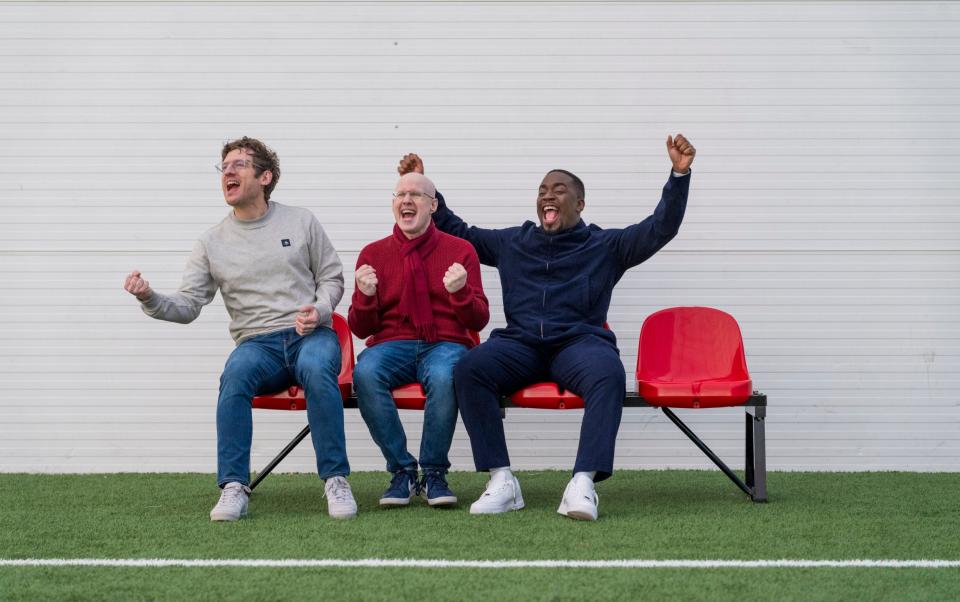
“It feels like a family event at Selhurst Park,” adds Mensah. “Loads of kids around.” There is a familial ease to these three, too: while posing for photos with 28-year-old Mensah in the middle, arms around shoulders, Lucas quips, “See, gay adoption does work!” Mensah is equally quick to remind them that he was in Year 4 when Lucas appeared on a Euro 2004 episode of FFL (“My daughter’s in Year 4,” notes James, glumly). “Statto was often the butt of the joke, but we wanted Mens to take the mick out of us,” says Lucas. “Which he does very well.”
Mensah opened the first series with pointed gags about how the decline of taking the knee proved football had “solved” racism. “Racism is a societal issue, not a football issue,” he says now. “Most people go to watch a good match, so I don’t think we should allow the bad eggs to tarnish the entire game. At the same time, we can’t relax about it – football can be a force for positive change. Bigotry comes from ignorance.”
Perhaps the most welcome transformation in football since the mid-1990s has been the rise of the women’s game. The series accordingly features guests including the former England player Jill Scott and the Chelsea boss Emma Hayes, plus regular clips from the Women’s Super League. But comedy about the women’s game remains a loaded prospect.
“None of us wants to be making cheap gags,” asserts Mensah. “Comedically, you have to talk about things that are in the culture,” says Lucas. “But we’re well aware that we’re all men, so it has to be the right joke, not a pile-on.”
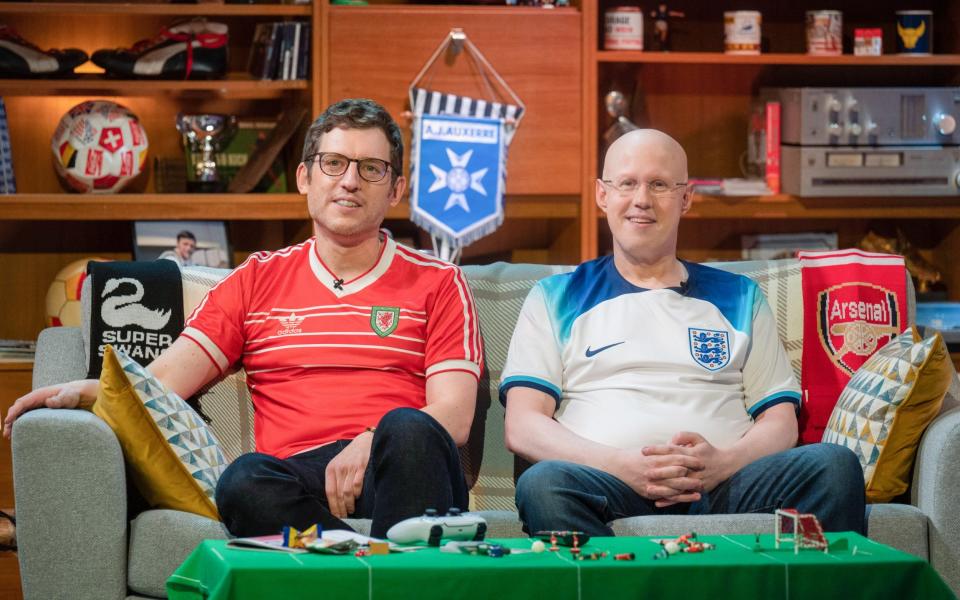
The landscape of football broadcasting has also been transformed: FFL now competes with YouTube, social media and podcasts, yet certain warhorses endure. James and Lucas both watch Match of the Day (Mensah favours Sky’s highlights on YouTube) and appreciate its host, Gary Lineker, in spite of controversies around his salary and political views. “That’s for him and his agent to discuss with the BBC,” says James of the issues.
“He’s a very good presenter and was an excellent footballer,” Lucas nods, before pivoting deftly. “I think football coverage in general is better than ever. Sky does a great job, so do Amazon and TNT.”
The demise of A Question of Sport following a radical reboot is taken as a symbol of changing times, editorial misjudgments and a warning for the new FFL. “Some people didn’t take too well to the changes [on A Question of Sport], which was one of my biggest fears about bringing back Fantasy Football,” says Mensah. “‘Why are they changing an iconic show?’ We wanted to make this modern while not changing its essence.”
“Grandstand has gone, World of Sport has gone, Football Focus could go,” says Lucas. “But it’s [A Question of Sport] a big brand and people are very fond of it, so there might be a way to bring it back.”
“Football is the best sport,” concludes James. “The best to play, the best to watch. With this wealth of football coverage, 10-year-old me would just be in heaven. I hope we can keep earning our place in that, because I would love this to run and run.”
“I thought it was a bad idea,” jokes Lucas of FFL’s return. “But you could say I’ve spent my career making bad decisions.”
Series two of Fantasy Football League begins on Sky Max at 10pm on Friday and also airs on NOW

 Yahoo News
Yahoo News 
